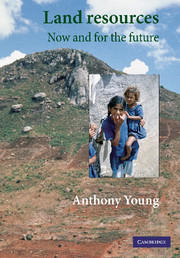Book contents
- Frontmatter
- Contents
- Preface
- Acknowledgements
- Note on acronyms and currency
- 1 Concern for land
- 2 Land resource issues
- 3 Resource survey and land evaluation
- 4 Competition for land
- 5 Working with farmers
- 6 Land use planning
- 7 Land degradation
- 8 Global issues: climatic change and biodiversity
- 9 Monitoring change: land resource indicators
- 10 Costing the earth: the economic value of land resources
- 11 Land management: caring for resources
- 12 Research and technology
- 13 Land, food, and people
- 14 Population, poverty, and conflict
- 15 Awareness, attitudes, and action
- Notes
- References
- Index
7 - Land degradation
Published online by Cambridge University Press: 04 August 2010
- Frontmatter
- Contents
- Preface
- Acknowledgements
- Note on acronyms and currency
- 1 Concern for land
- 2 Land resource issues
- 3 Resource survey and land evaluation
- 4 Competition for land
- 5 Working with farmers
- 6 Land use planning
- 7 Land degradation
- 8 Global issues: climatic change and biodiversity
- 9 Monitoring change: land resource indicators
- 10 Costing the earth: the economic value of land resources
- 11 Land management: caring for resources
- 12 Research and technology
- 13 Land, food, and people
- 14 Population, poverty, and conflict
- 15 Awareness, attitudes, and action
- Notes
- References
- Index
Summary
Land degradation lowers the productive potential of land resources, affecting soils, water, forests and grasslands. If unchecked, it can lead to irreversible loss of the natural resources on which production depends. The severity of two kinds of degradation, soil erosion and rangeland degradation (desertification), have sometimes been subject to exaggerated claims. Both are indeed widespread and serious, but satisfactory measurements of their effects have yet to be made. Soil fertility decline is more widespread than formerly realized, leading to reduced crop yields and lowered responses to fertilizers. About 5% of the agricultural land in developing countries has been lost by degradation, and productivity has been appreciably reduced on a further 25%. Some 10% of irrigated land is severely salinized. In the semi-arid zone where water is most needed, the limits to water availability have been reached. Over the past 10 years, forest cover in tropical regions has been lost at 0.8% a year, and there is no sign yet that the rate of clearance has been checked.
The direct causes of degradation are a combination of natural hazards with unsuitable management practices. Underlying these are economic and social reasons, fundamentally arising from poverty and land shortage. There is a causal link between population increase, land shortage, poverty and land degradation. Tentative economic analysis suggests that degradation is costing developing countries between 5% and 10% of their agricultural sector production. This affects the people through reduced food supplies, lower incomes, greater risk, and increased landlessness.
- Type
- Chapter
- Information
- Land ResourcesNow and for the Future, pp. 101 - 133Publisher: Cambridge University PressPrint publication year: 1998
- 1
- Cited by



